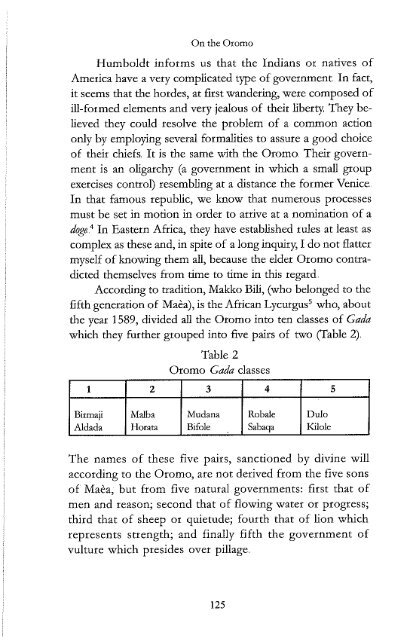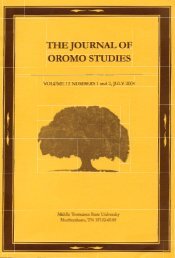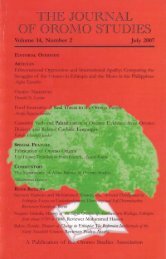JOS volume 14 Number 1 (2007).pdf - Oromo Studies Association
JOS volume 14 Number 1 (2007).pdf - Oromo Studies Association
JOS volume 14 Number 1 (2007).pdf - Oromo Studies Association
You also want an ePaper? Increase the reach of your titles
YUMPU automatically turns print PDFs into web optimized ePapers that Google loves.
On the <strong>Oromo</strong><br />
Humboldt informs us that the Indians or natives of<br />
America have a very complicated type ofgovernment In fact,<br />
it seems that the hordes, at first wandering, were composed of<br />
ill-formed elements and very jealous of their liberty. They believed<br />
they could resolve the problem of a common action<br />
only by employing several formalities to assure a good choice<br />
of their chiefs. It is the same with the aroma. Their government<br />
is an oligarchy (a government in which a small group<br />
exercises control) resembling at a distance the former Venice.<br />
In that famous republic, we know that numerous processes<br />
must be set in motion in order to arrive at a nomination of a<br />
doge 4 In Eastern Africa, they have established rules at least as<br />
complex as these and, in spite of a long inquiry, I do not flatter<br />
myself of knowing them all, because the elder aroma contradicted<br />
themselves from time to time in this regard<br />
According to tradition, Makko Bili, (who belonged to the<br />
fifth generation of Maea), is the Aftican Lycurgus' who, about<br />
the year 1589, divided all the aroma into ten classes of Gada<br />
which they further grouped into five pairs of two (Table 2).<br />
Table 2<br />
aroma Gada classes<br />
1 2 3 4 5<br />
Birmaji Malba Mudana Robale Dulo<br />
Aldada Horata Bifole Sabaga Kilole<br />
The names of tbese five pairs, sanctioned by divine will<br />
according to the aroma, are not derived hom the five sons<br />
of Maea, but from five natural governments: first that of<br />
men and reason; second that of flowing water or progress;<br />
third that of sheep or quietude; fourth that of lion which<br />
represents strength; and finally fifth the government of<br />
vulture which presides over pillage.<br />
125




